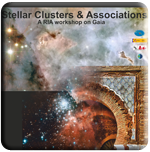MALT90: The Millimetre Astronomy Legacy Team 90 GHz Survey
Jackson, J. M.; Rathborne, J. M.; Foster, J. B.; Whitaker, J. S.; Sanhueza, P.; Claysmith, C.; Mascoop, J. L.; Wienen, M.; Breen, S. L.; Herpin, F.; Duarte-Cabral, A.; Csengeri, T.; Longmore, S.; Contreras, Y.; Indermuehle, B.; Barnes, P. J.; Walsh, A. J.; Cunningham, M. R.; Brooks, K. J.; Britton, T. R.; Voronkov, M. A.; Urquhart, J. S.; Alves, J.; Jordan, C. H.; Hill, T.; Hoq, S.; Finn, S.; C., S.; Bains, I.; Bontemps, S.; Bronfman, L.; Caswell, J. L.; Deharveng, L.; Ellingsen, S. P.; Fuller, G. A.; Garay, G.; Green, J. A.; Hindson, L.; Jones, P. A.; Lenfestey, C.; Lo, N.; Lowe, V.; Mardones, D.; Menten, K. M.; Minier, V.; Morgan, L. K.; Motte, F.; Muller, E.; Peretto, N.; Purcell, C. R.; Schilke, P.; Schneider-Bontemps, N.; Schuller, F.; Titmarsh, A.; Wyrowski, F.; Zavagno, A.
Publications of the Astronomical Society of Australia, Volume 30, id.e057 13 pp. (2013).
11/2013
ABSTRACT
The Millimetre Astronomy Legacy Team 90 GHz (MALT90) survey aims to characterise the physical and chemical evolution of high-mass star-forming clumps. Exploiting the unique broad frequency range and on-the-fly mapping capabilities of the Australia Telescope National Facility Mopra 22 m single-dish telescope, MALT90 has obtained 3' x 3' maps toward ~2000 dense molecular clumps identified in the ATLASGAL 870 um Galactic plane survey. The clumps were selected to host the early stages of high-mass star formation and to span the complete range in their evolutionary states (from prestellar, to protostellar, and on to HII regions and photodissociation regions). Because MALT90 mapped 16 lines simultaneously with excellent spatial (38") and spectral (0.11 km/s) resolution, the data reveal a wealth of information about the clump's morphologies, chemistry, and kinematics. In this paper we outline the survey strategy, observing mode, data reduction procedure, and highlight some early science results. All MALT90 raw and processed data products are available to the community. With its unprecedented large sample of clumps, MALT90 is the largest survey of its type ever conducted and an excellent resource for identifying interesting candidates for high resolution studies with ALMA.


